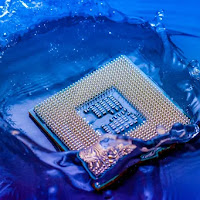Boiling Water Could Revolutionize Electronics Cooling
Electronics generate heat, especially high-performance processors in phones and computers. Cooling these components is a constant challenge. University of Tokyo scientists are exploring a surprisingly simple solution: boiling water. They have developed a new system with the potential to transform thermal management.
Leveraging the Potential of Phase Change
The core idea is remarkably intelligent. When water transitions from liquid to steam, it absorbs a significant amount of energy. This phase change, from liquid to gas, excels at heat removal. Specifically, it absorbs approximately seven times the energy needed to heat liquid water. However, using steam in narrow cooling channels within chips has been problematic. Steam can resist flowing smoothly in tiny tubes, limiting its effectiveness.
The Microchannel Magic Trick
The Tokyo team discovered a way to overcome this limitation. They engineered special 3D microfluidic channels – extremely small pipes – featuring a clever capillary structure and a manifold distribution layer. The precise shape of these minute channels and the water flow dynamics are crucial. Through careful design, they achieved a consistent water and steam flow throughout the system.
Ten Times Better Cooling Performance
The results are impressive. This innovative design attained a Coefficient of Performance (COP) of 100,000. This is about ten times greater than traditional water cooling using only liquid water. Masahiro Nomura, the lead researcher, states that this design "may open new avenues for achieving the cooling required" for future electronics.
Beyond Computers: Broad Applications
This technology promises smaller and more efficient cooling systems. Reliance on exotic coolants could decrease. High-performance computing stands to benefit significantly, enabling more powerful chips without bulky, energy-intensive cooling setups. The impact extends beyond computers to lasers, LEDs, radar equipment, and even automotive and aviation applications.
Passive Cooling Possibilities Emerge
A key advantage is the potential for passive operation. The natural process of water boiling into steam and dissipating heat through convection could enable cooling without pumps or fans. This suggests quiet, highly efficient cooling in compact spaces without power consumption.
The Future is Cool, Indeed
As chips become smaller and more powerful, thermal control is rapidly becoming a major concern. While active cooling solutions are being explored, this two-phase water system developed by the University of Tokyo presents a potential game-changer, particularly for passive cooling. Boiling water may be the answer to maintaining respectable performance levels in future technology. It certainly appears to be a promising direction.


